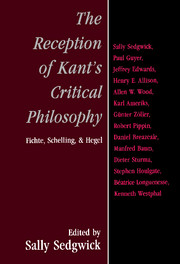Book contents
- Frontmatter
- Contents
- Notes on the Contributors
- Acknowledgments
- Introduction: Idealism from Kant to Hegel
- 1 The Unity of Nature and Freedom: Kant's Conception of the System of Philosophy
- 2 Spinozism, Freedom, and Transcendental Dynamics in Kant's Final System of Transcendental Idealism
- 3 Is the Critique of Judgment “Post-Critical”?
- 4 The “I” as Principle of Practical Philosophy
- 5 The Practical Foundation of Philosophy in Kant, Fichte, and After
- 6 From Critique to Metacritique: Fichte's Transformation of Kant's Transcendental Idealism
- 7 Fichte's Alleged Subjective, Psychological, One-Sided Idealism
- 8 The Spirit of the Wissenschaftslehre
- 9 The Beginnings of Schelling's Philosophy of Nature
- 10 The Nature of Subjectivity: The Critical and Systematic Function of Schelling's Philosophy of Nature
- 11 Substance, Causality, and the Question of Method in Hegel's Science of Logic
- 12 Point of View of Man or Knowledge of God: Kant and Hegel on Concept, Judgment, and Reason
- 13 Kant, Hegel, and the Fate of “the” Intuitive Intellect
- 14 Metaphysics and Morality in Kant and Hegel
- Bibliography
- Index
9 - The Beginnings of Schelling's Philosophy of Nature
Published online by Cambridge University Press: 03 December 2009
- Frontmatter
- Contents
- Notes on the Contributors
- Acknowledgments
- Introduction: Idealism from Kant to Hegel
- 1 The Unity of Nature and Freedom: Kant's Conception of the System of Philosophy
- 2 Spinozism, Freedom, and Transcendental Dynamics in Kant's Final System of Transcendental Idealism
- 3 Is the Critique of Judgment “Post-Critical”?
- 4 The “I” as Principle of Practical Philosophy
- 5 The Practical Foundation of Philosophy in Kant, Fichte, and After
- 6 From Critique to Metacritique: Fichte's Transformation of Kant's Transcendental Idealism
- 7 Fichte's Alleged Subjective, Psychological, One-Sided Idealism
- 8 The Spirit of the Wissenschaftslehre
- 9 The Beginnings of Schelling's Philosophy of Nature
- 10 The Nature of Subjectivity: The Critical and Systematic Function of Schelling's Philosophy of Nature
- 11 Substance, Causality, and the Question of Method in Hegel's Science of Logic
- 12 Point of View of Man or Knowledge of God: Kant and Hegel on Concept, Judgment, and Reason
- 13 Kant, Hegel, and the Fate of “the” Intuitive Intellect
- 14 Metaphysics and Morality in Kant and Hegel
- Bibliography
- Index
Summary
Schelling's philosophy of nature is known to be the counterpart to his version of transcendental idealism which dominated his first writings from 1794 on (Über die Möglichkeit einer Form der Philosophie überhaupt). Only after he had left the Tübinger Stiff and entered the university of Leipzig in 1796 in order to study mathematics, natural sciences, and medicine, did he become more interested in the field of physics and other sciences. His Ideen zu einer Philosophie der Natur of 1797 was the first of a series of books and articles that made him famous for being the inaugurator of the new, speculative “Natur-philosophie” that marked his place in the history of post-Kantian philosophy.
In light of the recent discovery and publication of his early commentary on Plato's Timaeus, the story of his philosophical development has to be rewritten. The early influence of Kant's and Leibniz's philosophy of nature can no longer be considered the main factors contributing to the new conception of a cosmology that could satisfy the conditions set by the revolution in philosophy due to Kant and Fichte. The text of Schelling's commentary also documents the great impact that Reinhold's early philosophy made on him, although for only a short time. Schelling's later reputation as the Plato of his time, which was ill-founded as long as his youthful attempts to interpret and transform Plato's thought were not taken account of, also now gains at least some plausibility.
- Type
- Chapter
- Information
- The Reception of Kant's Critical PhilosophyFichte, Schelling, and Hegel, pp. 199 - 215Publisher: Cambridge University PressPrint publication year: 2000
- 4
- Cited by



